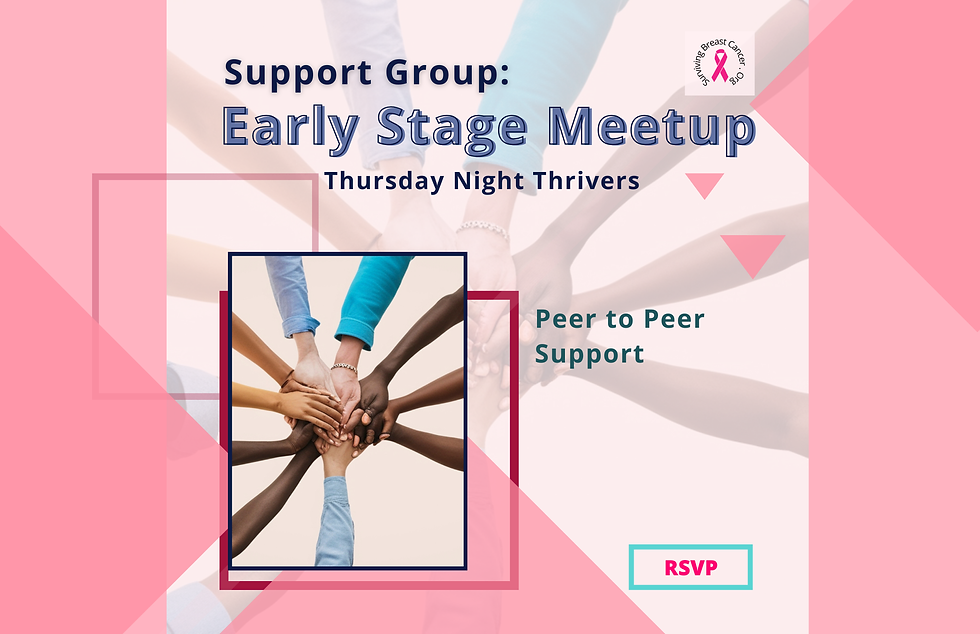From Chemo to Cleanings: Navigating Oral Health with Breast Cancer
- Surviving Breast Cancer

- Sep 16, 2025
- 3 min read
Updated: Sep 22, 2025

By Abida Taher, MD, PhD
The American Cancer Society estimates that about 316,950 new cases of invasive breast cancer will be diagnosed in women in 2025. More than 30-35% of patients undergoing cancer treatment will suffer from oral complications. A number of breast cancer treatments, including chemotherapy, and some targeted therapies like Herceptin (trastuzumab) and newer treatments like bispecifics (Datroway) can cause painful oral side effects, including mouth sores, teeth sensitivity, and dry mouth.
Apart from cancer treatment, many other medications, including antidepressants, antihistamines, decongestants, diuretics, blood pressure medications, and certain pain relievers, can cause oral issues. Regardless of the type of treatment you are getting, maintaining good oral health goes a long way in easing your treatment experience and supporting your body as it constantly adjusts to your new reality.
The Oral Cavity (Or Mouth) is All About Balance
A healthy mouth is a balance of saliva flow and consistency, bacteria, diet, cleanliness, and minimal plaque. Cancer treatment can disturb this balance and cause complications that interfere with your treatment and adversely affect your quality of life.
Establishing an optimal oral care routine and being prepared with knowledge and products to help deal with the side effects of treatment is important. Too many patients wind up with complications, ultimately leading to tooth loss. Your dentist can help you maintain tooth structure and keep you comfortable through treatment. They will make treatment recommendations based on your caries risk assessment, as well as your type of cancer and cancer treatment. Delaying dental treatment and leaving problem areas may result in a delay of cancer treatment in the future.
The American Dental Association lists the following common oral side effects from cancer treatment:
Cavities, also known as caries
Teeth and gum sensitivity
Changes in taste
Dry mouth
Jaw stiffness
Oral sores or mucositis
These side effects can cause difficulty in eating, talking, or swallowing. The changes in your immune response will also make it harder to fight oral infections. Having a preventative protocol can help significantly decrease the severity of these side effects and help you maintain a good quality of life.
Oral Health Recommendations for Cancer Patients
Here are some recommendations that can help with your oral health during cancer treatment:
Decrease cavity risk by brushing with a fluoride or hydroxyapatite toothpaste at least twice a day.
Flossing will reduce your chances of developing cavities on the interproximal surfaces or in between your teeth. However, if you have never flossed before, do not start during cancer treatment.
Avoid foods and drinks that are high in sugar.
Sugar-free candies or chews, especially those made with Xylitol, will help stimulate saliva flow. Not only does the flavor stimulate saliva flow, but just chewing does as well.
Limiting refined sugars as well as the length of exposure to sugary foods is important. You are at more risk of developing decay if you have a piece of candy or sugary gum in your mouth all day versus eating it all at once and then drinking water. The combination of a sugary diet and bacteria leads to a lower pH or acidic environment in the mouth, which demineralizes the enamel.
Keeping your oral cavity hydrated and reducing dry mouth will help bathe the teeth and help fight decay.
Mouth rinses such as salt and baking soda mixes help keep the oral tissues moist and help combat the development of oral ulcerations. A basic pH mouth rinse (such as a salt and soda rinse) neutralizes the pH and can even help remineralize your tooth enamel.
Use a super soft toothbrush, especially when your oral mucosa is irritated.
Visit your dentist every 3 months for an exam and for any personalized treatment based on your oral health to prevent complications later.
As always, make sure your cancer care team and your dentist are communicating with each other regularly to optimize your care. Take charge of your oral health to assist your body as it adapts to your cancer treatment.
Note: This article offers general information and does not replace professional medical advice. Make sure to discuss your options with your healthcare provider.
About the Author:
Abida Taher, MD, PhD
Founder, uncancer.com
Read more about our team and products at www.uncancer.com
Read More:
On the Podcast: Breast Cancer Conversations
What a Holistic Nutritionist Wants Every Cancer Patient to Know About Food & Wellness with Cindy Fortuna
Share your story, poetry, or art:
SurvivingBreastCancer.org Resources & Support:










